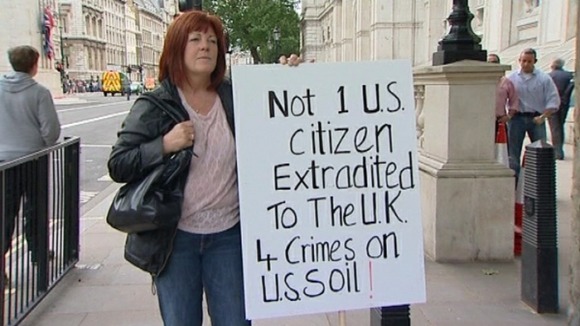- Tory MP Dominic Raab unearths damning figures
- More Britons extradited in the last six months than US has sent back in five years
By
James Slack
PUBLISHED:
00:21, 23 June 2012
|
UPDATED:
00:21, 23 June 2012
Seven times more British citizens
have been sent to the US under the lopsided Extradition Act than there
have been Americans sent in the opposite direction.
Home
Office figures reveal how the treaty at the centre of the case against
Asperger’s sufferer Gary McKinnon is being used by the US authorities
far more often than their British counterparts.
Since
2004, 99 people have been extradited from the UK to the US. Yet only 44
have been extradited to the UK. When the figures are broken down by
nationality, the picture is even more stark.
Some
35 British nationals have been extradited from the UK to the US. But as
few as five US citizens have been extradited from the US to the UK.
Britain
has extradited more of its nationals to the United States in the past
six months – seven – than the United States has sent the other way in
the past five years, according to data unearthed by the Tory MP Dominic
Raab.
This is despite the fact the population of the US (311million) is five times greater than that of the UK (62million).
The
figures will heighten calls for changes to the Act, which was passed by
Labour in 2003 and is currently under review by the Home Secretary.
Critics say it is biased
against UK nationals. Britain must provide US authorities with ‘such
information as would provide a reasonable basis to believe that the
person sought committed the offence for which extradition is requested’.
This
is known as the ‘probable cause’ test and means US citizens have the
right to a court hearing to examine the evidence against them. However,
if the US wants to extradite a UK citizen, the authorities need only to
outline the alleged offence, the punishment specified by statute and
provide an accurate description of the suspect.

Tory MP Dominic Raab unearthed the alarming figures
The most high-profile victim of the
Act is Mr McKinnon, who faces being hauled to the US for crimes
committed from his North London bedroom.He
hacked into NASA and Pentagon computers while looking for evidence of
‘little green men’ Medical experts say he is likely to take his own life
if extradited.
As well as his, there have been a string of other controversial extradition cases.
They
include Chris Tappin, a retired golf club president from Kent who was
extradited to the US in February over allegations of arms dealing.
Student
Richard O’Dwyer, of Chesterfield, is also fighting extradition on
copyright infringement charges over a website he ran from the UK.
Last
night Mr Raab, who has campaigned for changes to the extradition rules,
said: ‘In 2012, we are surrendering our citizens to the US at the
fastest rate since the new treaty came into effect, despite woefully
inadequate safeguards.
Overall,
we have extradited seven UK nationals for every American extradited to
Britain. If we don’t reform our blunt extradition regime, we will see
more appalling cases.’
Campaigners
are also demanding changes to the controversial European Arrest Warrant
(EAW), which allows people to be sent to other EU countries over even
minor charges.
As
with the Extradition Act, the country demanding a British or EU citizen
does not have to make a substantial case against them.
The
number of EAWs issued to the UK has risen from 1,865 in 2004 to 5,832
in the year ending March 2012. Britain is extraditing 11 times more
people than are being sent to the UK by our EU neighbours. The number of
British citizens surrendered under an EAW has risen from five in 2004
to 32 in 2011/12.
Mr
Raab said: ‘Britain now extradites six times more of our nationals
under the European Arrest Warrant than the US treaty. Too many face
corrupt police, incompetent courts and appalling prison conditions.
‘The case for reform or withdrawal from this flawed measure is overwhelming.’
A
Home Office spokesman said: ‘We have effective, fair and balanced
extradition arrangements with the US and other international partners.
‘People
who have committed serious offences such as murder, rape, other sex
crimes and fraud, have been successfully extradited to the UK and
convicted.’
............................................................................
The Telegraph Published a similar piece here
The US Embassy provides a comment of its own to try and explain the disparity in the numbers
“While the U.S. does send more extradition requests to the UK than it
receives, this difference is largely due to the differences in the size of
the respective populations. The number of U.S. requests is not
disproportionate.”
The Home Office States
‘People
who have committed serious offences such as murder, rape, other sex
crimes and fraud, have been successfully extradited to the UK and
convicted.’
"It should also be noted that our courts have refused to extradite nine people
requested by the US since 2004, while US courts have not refused any of our
extradition requests."
This utterly canned statement is churned out at every opportunity to the media and in view of the refusal of the UK to extradite an American paedophile seem a tad disingenuous
.............................................................................







